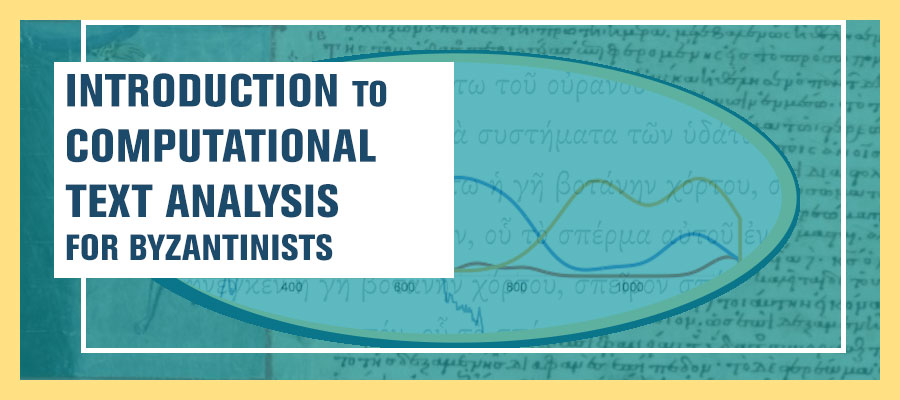Introduction to Computational Text Analysis for Byzantinists
This online workshop will offer Byzantinists an applied introduction to computational text analysis. Over the course of three sessions, participants will 1) learn the basics of programming with the Wolfram Language in Mathematica; 2) experiment with a series of text analysis functions on a common set of biblical texts (in both Greek and English); and 3) apply their new skills to a digital Byzantine text of their own choosing.
The instructor will provide an optional bibliography before the first workshop, all required computational materials, and a corpus of biblical texts for session 2. Before the first session, participants will need to install on their computers Mathematica 13.2. Thereafter, light exercises in coding and some preparatory work in-between sessions can be expected.
Course Outline
- Wednesday, March 15, 2023, 12:00–1:30 pm (EDT): Basics of programming with the Wolfram Language in Mathematica; preparing a text for analysis.
- Wednesday, March 22, 2023, 12:00–1:30 pm (EDT): Use Mathematica to perform a series of text analysis functions on a common set of biblical texts.
- Wednesday, March 29, 2023, 12:00–1:30 pm (EDT): Use Mathematica to perform text analysis on a digital Byzantine text of your choosing.
Time Commitment & Prerequisites
- The time commitment for this workshop is six hours of instruction and an additional one–two hours between each session for light exercises in coding and preparatory work. Participants are required to attend all sessions.
- Participants should have at least beginner level Greek.
Workshop Checklist
- Computer capable of running Mathematica 13.2. Basic requirements include 19 GB of disk space and at least 4 GB RAM. More information on compatible operating systems is available HERE.
- Mathematica 13.2 (Desktop) pre-installed. Mathematica 13.2 requires a paid license. Many universities have an institutional license. You can check to see if you have access through your university HERE. You must your university email address to check your access. Please check your access prior to registering for the workshop. The registration form will ask you to indicate if you have institutional access.
- Stable internet connection.
The workshop is limited to 15 participants. Registration is first come, first served.
REGISTRATION FOR THIS WORKSHOP IS CLOSED.
Who is eligible?
- Graduate students and early career researchers (PhD received after January 2015) in the field of Byzantine studies. Students enrolled in graduate programs in North America and early career researchers working in North America will be given priority. Graduate students and early career researchers outside of North America will be placed on a waiting list and contacted if space is available.
- All participants must be BSANA members. BSANA membership is free for graduate students and early-career contingent scholars who have earned their PhD within the last eight years and who do not hold a permanent or tenure-track appointment. If you are not already a BSANA member, please complete the BSANA Membership Form before registering for the workshop. Your membership status will be confirmed before your space in the workshop is confirmed.
This workshop is part of the partnership between the Mary Jaharis Center for Byzantine Art and Culture and the Byzantine Studies Association of North America to provide digital humanities training opportunities to graduate students and early career researchers.
